- Home
- Caroline Anderson
The Single Mom and the Tycoon
The Single Mom and the Tycoon Read online
David sucked in his breath, ran his hand over her ribs so his palm was against her skin. She gasped as they came into contact, and she heard his breath catch, too.
“Beautiful,” he said roughly, and then, anchoring her head with his other hand, he lowered his mouth to hers and kissed her properly for the first time.
“Can we lose the light?” he said, and she realized he was still afraid of her reaction.
“No,” she said, not knowing at all if it was the right thing to do, but just sure she wanted to see him, wanted him to see her, so there would be no secrets, nothing left to shock or surprise or disappoint. She lifted her hand and touched it to his heart. “I want to see you. I want to look into your eyes. I want to know it’s you, and I want you to know it’s me, warts and all.”
Caroline Anderson has the mind of a butterfly. She’s been a nurse, a secretary, a teacher, has run her own soft-furnishing business and is now settled on writing. She says, “I was looking for that elusive something. I finally realized it was variety, and now I have it in abundance. Every book brings new horizons and new friends, and in between books I have learned to be a juggler. My teacher husband, John, and I have two beautiful and talented daughters, Sarah and Hannah, umpteen pets and several acres of Suffolk that nature tries to reclaim every time we turn our backs!”
CAROLINE ANDERSON
The Single Mom and the Tycoon
TORONTO • NEW YORK • LONDON
AMSTERDAM • PARIS • SYDNEY • HAMBURG
STOCKHOLM • ATHENS • TOKYO • MILAN • MADRID
PRAGUE • WARSAW • BUDAPEST • AUCKLAND
The Single Mom and the Tycoon
As part of Harlequin’s 60th anniversary
celebrations, Harlequin Romance® is proud to
bring you a month of Diamond Brides in February.
There’s twin trouble in Caroline Anderson’s book
Two Little Miracles
CONTENTS
PROLOGUE
CHAPTER ONE
CHAPTER TWO
CHAPTER THREE
CHAPTER FOUR
CHAPTER FIVE
CHAPTER SIX
CHAPTER SEVEN
CHAPTER EIGHT
CHAPTER NINE
CHAPTER TEN
PROLOGUE
NOW what?
He turned his head, eyeing the vibrating, cheerful little phone on his bedside locker with distaste. God, he loathed that ring-tone. Why on earth hadn’t he changed it?
It stopped, and he dropped his head back against the pillows and closed his eyes, trying to get back to that quiet place inside where nothing could reach him.
But not for long.
The phone rang again, and he sighed and picked it up.
Damn. Not Georgie. Anyone else—anyone who knew—but not little sister. Not now.
Except she wouldn’t give up, of course. She never did. She was going to keep on ringing and texting and driving him mad until eventually he gave up and spoke to her, so he might as well get it over with.
Bracing himself for the inevitable lecture, he stabbed the button and forced some enthusiasm into his voice. ‘Georgie—hi! How’re you doing?’
‘Fine—not that you care, or you wouldn’t screen my calls!’
His laugh cracked a little, and he coughed to cover it.
‘Yeah, yeah, I know, I’m a lousy brother,’ he said, not bothering to deny the call screening. ‘So—what have I done wrong this time?’
‘Nothing.’
‘Good God. A miracle.’
‘Don’t get overexcited, there’s still a chance,’ she warned, and he wondered what she wanted. Something, for sure. She always did. And he always failed her—
‘Now, are you listening?’ she went on. ‘I’ve got to tell you something really important, and you’ve got to pay attention.’
‘As if I don’t always,’ he said drily, and heard her chuckle.
‘Yeah, right. When you’re not ignoring me. I’ve been trying to get you for days to tell you—no surprises there. I don’t know where you hide. Anyway, the thing is, Dad’s getting married again—to Liz, Nick’s mother—you know, my mother-in-law?’
‘Married?’ He straightened up, stunned. ‘That’s a bit sudden, isn’t it?’
‘Sudden? David, they’ve known each other for two years! It’s hardly sudden, and he’s lonely, and they get on so well. It’s time he moved on. It’s been seven years since Mum died. That’s long enough.’
Seven years? Really? ‘I can’t believe that,’ he said.
‘Believe it. And you have to come home for the wedding. You haven’t been home since before Dad’s heart attack, and if it’s not been one darned excuse it’s been another, but you have to come home for this, no isn’t an option. Your empire will have to take care of itself for a while. He wants you to be his best man, but he won’t ask you himself, you know what he’s like, but he really wants you here standing by his side. And don’t even think about breaking something just to get out of it.’
‘As if,’ he said, trying to make a joke of it, but she wasn’t laughing.
‘Don’t give me that. It’s time you came home, David, even if you’re in a total body cast,’ she said firmly, and he swallowed again and stared down the bed at his feet.
He didn’t think so. The timing couldn’t have been worse—and, as for being his father’s best man—standing by him—well, that was some kind of sick joke, wasn’t it?
‘When’s the wedding?’ he asked, hoping to God it wasn’t another life-changing event he was going to miss because of this stupid, stupid—
‘Not for a while. They want to get the spa finished so he can enjoy the wedding.’
‘Spa?’
Her sigh spoke volumes, and he knew he was in trouble again. ‘You really don’t listen to anything, do you? Nick bought the old hotel at the top of the high street with Dan Hamilton and Harry Kavenagh: Dan’s the architect, and Dad’s firm are doing the work. Ring any bells?’
‘Cheeky. Of course it rings bells,’ he lied. ‘Sorry, I’ve had a lot on my plate. I knew they were working on something, I’d just forgotten it was going to be a spa.’
‘Not just any spa,’ she said, and he could hear the pride in her voice. ‘It’s going to be amazing. They’re turning it into a top-end residential and day spa and gym, properly state-of-the-art, and it’s going to be fantastic but it’s been a bit of a killer for Dad. It’s a big job to oversee. It’s due to open next Easter, and he says he can’t think about the wedding till it’s all signed off, so they want to get married as soon as it’s open.’
Easter. He frowned at his feet, moved the left one, wriggled the toes. Winced as the pain shafted through it and, for once, he welcomed it. That would be some time in April. And it was June now. So—ten months. Would he be ready? Would he ever be ready?
Have to be. This was his father, and he’d asked for nothing over the past ten years. He’d lost his wife, had a heart attack and bypass surgery that David hadn’t been able to be there for, ended up with crippling business problems because of his illness that he’d never once mentioned—and he’d gone through it all without asking his son for anything.
And he wasn’t asking now, but David couldn’t turn him down. Not this time. Georgie was right.
‘I’ll come,’ he said. ‘Tell him I’ll be there.’
‘Tell him yourself. Call him—if you really mean it.’
The door opened and a nurse came in with a porter and a big smile. ‘We’re ready for you, David.’
His heart lurched against his ribs and he held up his hand to stop her. ‘I mean it. I’ll come. I promise.’
‘Really?’
‘Really. Give him
my love. I have to go, I’ve got a meeting now and I’m going to be out of reach for a little while, but I’ll be in touch as soon as I’m back in range. Just tell him I’m coming.’
And without anything else, without saying goodbye or offering any further explanation, he turned off his phone, threw it into his locker and sucked in a lungful of air before meeting the nurse’s warm, sympathetic eyes with the nearest thing to a smile that he could muster.
‘Right, guys, let’s get this show on the road.’
‘You’re sure? You do understand what’s going to happen, David, and you’re OK with it?’
No, he wasn’t sure, not about anything, and he sure as hell wasn’t OK with it, but he’d put this off for too long as it was. And he knew he didn’t have a choice. Not if he was going to get on with his life.
‘I’m sure,’ he lied and, closing his eyes, he rested his head back on the pillow as she kicked the brakes off the bed and wheeled him down the corridor.
CHAPTER ONE
IT REALLY hadn’t changed at all.
Bits were different. More houses on the outskirts, perhaps, and a new roundabout on the access road, but fundamentally the same. And it still felt like home.
Bizarre, when it hadn’t been home for eleven years, and even more bizarre that, after more than three, he could drive back into the little seaside town and feel a wave of nostalgia that brought a lump to his throat the size of Ayers Rock.
He cruised slowly in on the main road in his little rental car, slowly absorbing the changes to the place where he’d honed his bad-boy skills and broken a hundred hearts.
Including those of his family, he thought with regret.
He hadn’t meant to. He’d only gone to Australia for a gap year after he graduated, but somehow it had stretched on and on, and he’d ended up so entrenched over there with his business interests that coming home for more than a flying visit had become all but impossible.
He sighed. He’d always intended to programme in enough time to come for longer, but the road to hell and back was paved with his good intentions and, in any case, for the last three years the matter had been taken out of his hands. The accident had happened just a couple of days before his father’s heart attack, and when he’d realised how serious his father’s heart condition was he’d been gutted that he couldn’t get home, but there’d been nothing he could do about it. He wasn’t fit to fly, so he’d played down the seriousness of the accident and told them he’d broken his ankle.
Which was true. Sort of. Then he’d missed Georgie’s wedding a couple of months later, as well—he’d been gutted about that, too, and she clearly hadn’t believed that his ankle was still responsible—after all, how bad could a fracture be?—but there was nothing he’d been able to do about that either so he’d just made himself unavailable, deliberately turning his phone off so he couldn’t be reached. After all, no news was supposed to be good news, wasn’t it, and Georgie was used to him not answering her calls.
Better to let them believe he was indifferent than add to their worries. Or so he’d thought. Had he been wrong?
Still, he was here now, and it was time to face the music. He wasn’t ready for this, but he was beginning to realise he’d never be ready, so he might just as well get on with it.
But not yet.
Putting off the evil moment a little longer, he headed towards the sea front, past the newly revamped hotel at the entrance to the town, smothered in flags advertising its imminent opening as the area’s premier health spa and leisure club.
It was impressive. The last time he’d seen it, it had been a tatty, run-down dump of a place, clearly struggling and in need of a massive cash injection. It had obviously had exactly that and, as always, his father had done a good job, he thought with pride.
Swallowing that persistent lump in his throat, he carried on down the main street, expecting the same old shops selling the same old stock. Except many of the shops were new, he noticed in surprise—in fact it was looking lively and vibrant and really rather inviting in a quaint and quintessentially English way.
Sleepy old Yoxburgh was clearly thriving in his absence.
He dropped down the steep little road to the sea front, past pavements clustered with tables spilling out of the front of the pretty Victorian houses now turned into hotels and cafés and trendy sea front flats, and cruised slowly along the prom and up past his sister’s house.
A big Victorian Italianate villa overlooking the sea front, it was part of a redevelopment his father had been involved in the last time he’d been home, and it made a stunning house. Impressive, yet welcoming at the same time. And expensive. Easily seven figures, if his finger was truly on the pulse of the UK property market.
The development had been the biggest thing his father had tackled to that point, but he’d applied the same principles of quality and integrity that he brought to everything and, yet again, he’d done a good job. At least until his heart attack, and then Georgie had taken over.
From what he could see at this distance, she hadn’t let her father down. Unlike him.
He shut off that train of thought and drove up past the side of the property, studying the small cluster of top-end homes grouped around behind it. Nick had ditched the previous architect’s plans and commissioned Georgie to redesign and finish the project, and she’d done a good job, at least on the outside. Again impressive, he thought, and yet homely. Well done, Georgie. He was looking forward to seeing it all in close up, especially the lovely house where she was now living with her husband and children. She’d told him enough about it and sent him photos, but it looked even better in the flesh.
She’d done well, but he’d never doubted she would, and if anyone deserved to be happy, it was Georgie. She’d had some rough times, got herself involved with a real bastard a few years ago, and it was great that she was happy now. But so many kids? Four and a half, at the last count. They must be nuts.
He suppressed a flicker of something that couldn’t possibly be envy and drove round the corner towards his rather more modest childhood home, a solidly respectable, warm and homely three storey half-timbered Edwardian house full of nooks and crannies for a child to hide in. He knew. He’d spent his childhood hiding in them and infuriating his sister because she couldn’t track him down.
He gave a hollow little laugh. Nothing different there, then.
He scanned the house and felt a pang of homesickness that took him by surprise.
It looked good. Freshly painted, the garden carefully tended, and his father, looking as solid and dependable as ever, was standing in the front garden with a slender, grey-haired woman who was smiling up at him with love in her eyes.
Not that he could see her eyes, but he hardly needed to. The body language said everything, but she wasn’t his mother and it seemed—wrong?
‘Don’t be ridiculous,’ he muttered, and kept right on past them, his heart thumping. Why shouldn’t his father find happiness? Just because his own life had taken a sharp and rather vicious downward turn didn’t mean his father didn’t deserve to be happy.
Without thinking about it, he found himself driving out of town and down the winding lane through the golf course to the little community at the mouth of the river where he’d spent every available moment as a child.
Unlike the main town, the harbour hadn’t changed a bit.
Or had it?
Sailing boats were pulled up on the shingle bank beside the quay as always, and there were cars parked outside the pub beside the little green, but the Harbour Inn looked as if it had undergone a revamp, like many of the houses at the smarter end. Nothing drastic, just the subtle evidence of a little more cash injected into the neighbourhood.
The harbour was a bit of a Jekyll and Hyde, torn between the fishermen and the yachties, the pub marking the dividing line; the smart houses in their fresh new paint were clustered together at one end and at the other, down near the ferry slipway and the entrance to the boatyard, the higgledy-piggledy c
ollection of old wooden bungalows and huts and sheds that made up the rest of the little community were clustered round the scruffy but bustling café that hadn’t seen a coat of paint in years.
It had sold the best fish and chips in town, though, he remembered, and he’d bet it still did.
He parked the car on the quay—pay and display now, he noticed, and realised he didn’t have a single coin of English money. Oh, what the hell. It was the end of April. Who was going to check on him?
But, just in case, he went over to the café, bought a cup of coffee in a foam cup and put the change in the meter, stuck the ticket in his windscreen and went for a wander while his coffee cooled.
And saw other changes. A new chandlery, some very expensive craft tied up to the moorings in the river, a new clubhouse for the yacht club—all sorts of changes, but the old ferry was still tied up to the jetty, and there was a pile of lobster pots and nets heaped against the fish shack. They were probably the same ones that had been there in his youth.
He turned a little sharply, and winced. God, his leg hurt after the flight. He stretched, flexed his knee, limping slightly as he reached the jetty and stood there, breathing in the familiar air.
‘Davey?’
He turned his head, incredulous. ‘Bob? Hell, you’re still here?’ he said with a laugh, and found himself engulfed in a hug that smelt of sweat and tar and bilge water, with more than a lingering trace of fish. It was the most welcome hug he’d had in years, and he blinked hard and stood back, studying the wrinkled, sun-trammelled face of the old harbour master, those shrewd eyes still brilliant blue and seeing altogether too much.

 From Heartache to Forever
From Heartache to Forever A Single Dad to Heal Her Heart
A Single Dad to Heal Her Heart Healing Her Emergency Doc
Healing Her Emergency Doc Tempted by the Single Mom
Tempted by the Single Mom Tempted By The Single Mom (Yoxburgh Park Hospital)
Tempted By The Single Mom (Yoxburgh Park Hospital)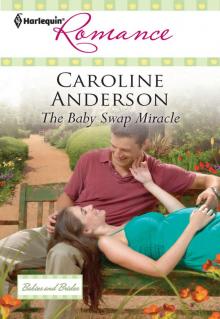 The Baby Swap Miracle
The Baby Swap Miracle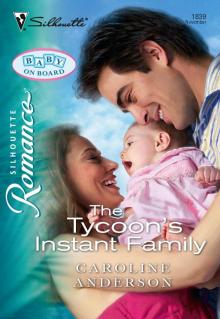 The Tycoon's Instant Family
The Tycoon's Instant Family Their Christmas Family Miracle
Their Christmas Family Miracle Valtieri's Bride & A Bride Worth Waiting For: Valtieri's BrideA Bride Worth Waiting For
Valtieri's Bride & A Bride Worth Waiting For: Valtieri's BrideA Bride Worth Waiting For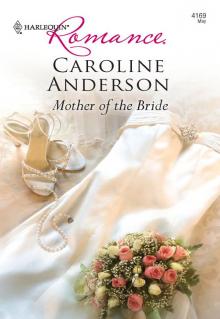 Mother of the Bride
Mother of the Bride Their Meant-to-Be Baby
Their Meant-to-Be Baby Best Friend to Wife and Mother?
Best Friend to Wife and Mother?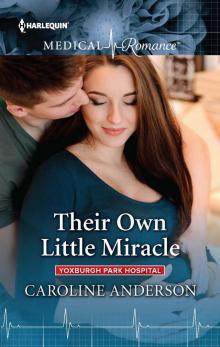 Their Own Little Miracle
Their Own Little Miracle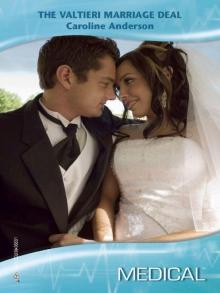 The Valtieri Marriage Deal
The Valtieri Marriage Deal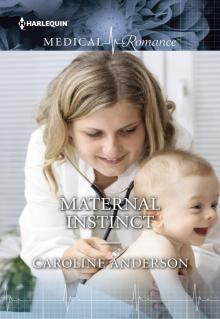 Maternal Instinct
Maternal Instinct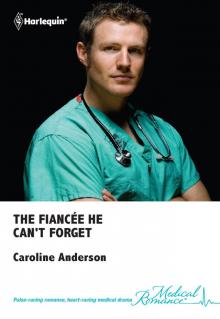 The Fiancé He Can't Forget
The Fiancé He Can't Forget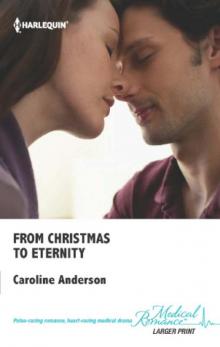 From Christmas to Eternity
From Christmas to Eternity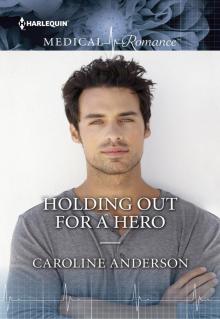 Holding Out For a Hero
Holding Out For a Hero Bound by Their Babies
Bound by Their Babies The Ideal Choice
The Ideal Choice SNOWED IN WITH THE BILLIONAIRE
SNOWED IN WITH THE BILLIONAIRE The Perfect Christmas
The Perfect Christmas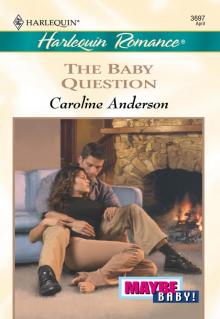 The Baby Question
The Baby Question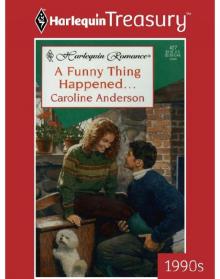 A Funny Thing Happened...
A Funny Thing Happened...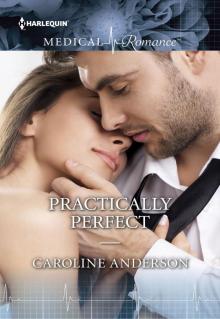 Practically Perfect
Practically Perfect A Wife and Child to Cherish (Audley Memorial Hospital)
A Wife and Child to Cherish (Audley Memorial Hospital)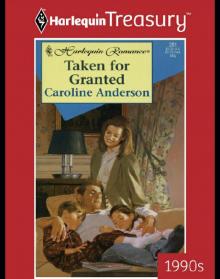 Taken For Granted
Taken For Granted The Midwife's Longed-For Baby
The Midwife's Longed-For Baby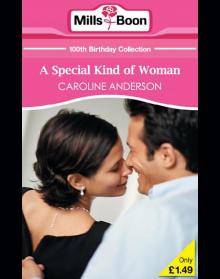 A Special Kind of Woman
A Special Kind of Woman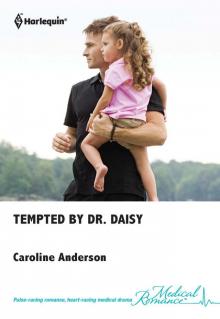 Tempted by Dr. Daisy
Tempted by Dr. Daisy A Mother by Nature
A Mother by Nature Accidental Rendezvous
Accidental Rendezvous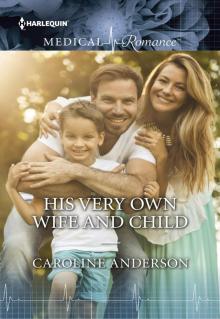 His Very Own Wife and Child
His Very Own Wife and Child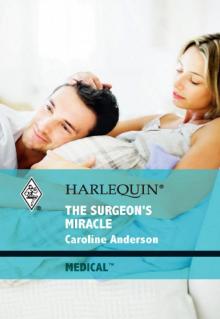 The Surgeon's Miracle
The Surgeon's Miracle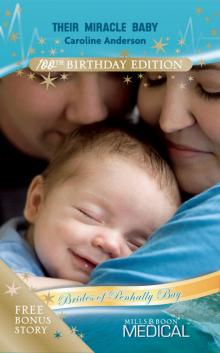 Their Miracle Baby
Their Miracle Baby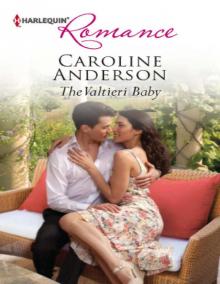 The Valtieri Baby
The Valtieri Baby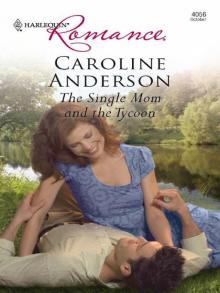 The Single Mom and the Tycoon
The Single Mom and the Tycoon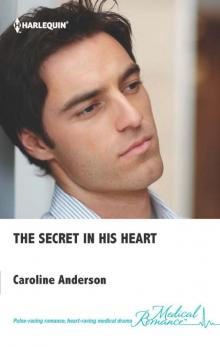 The Secret in His Heart
The Secret in His Heart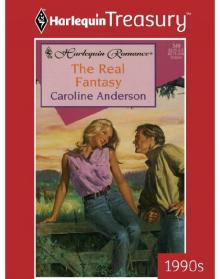 The Real Fantasy
The Real Fantasy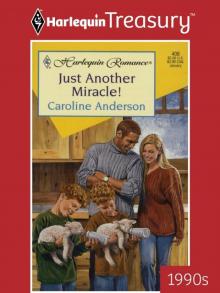 Just Another Miracle!
Just Another Miracle!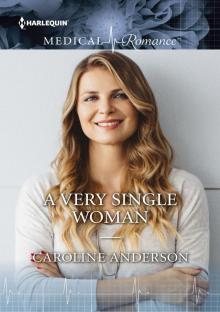 A Very Single Woman
A Very Single Woman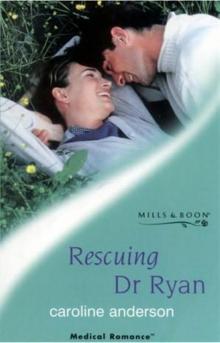 Rescuing Dr Ryan
Rescuing Dr Ryan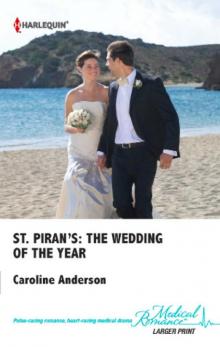 St. Piran's: The Wedding of The Year
St. Piran's: The Wedding of The Year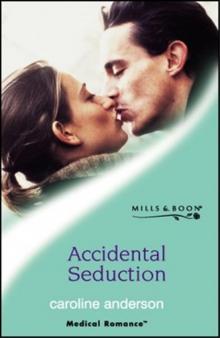 Accidental Seduction
Accidental Seduction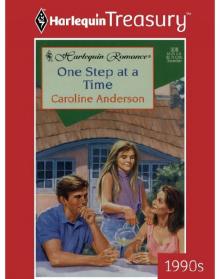 One Step At A Time
One Step At A Time A Perfect Hero
A Perfect Hero